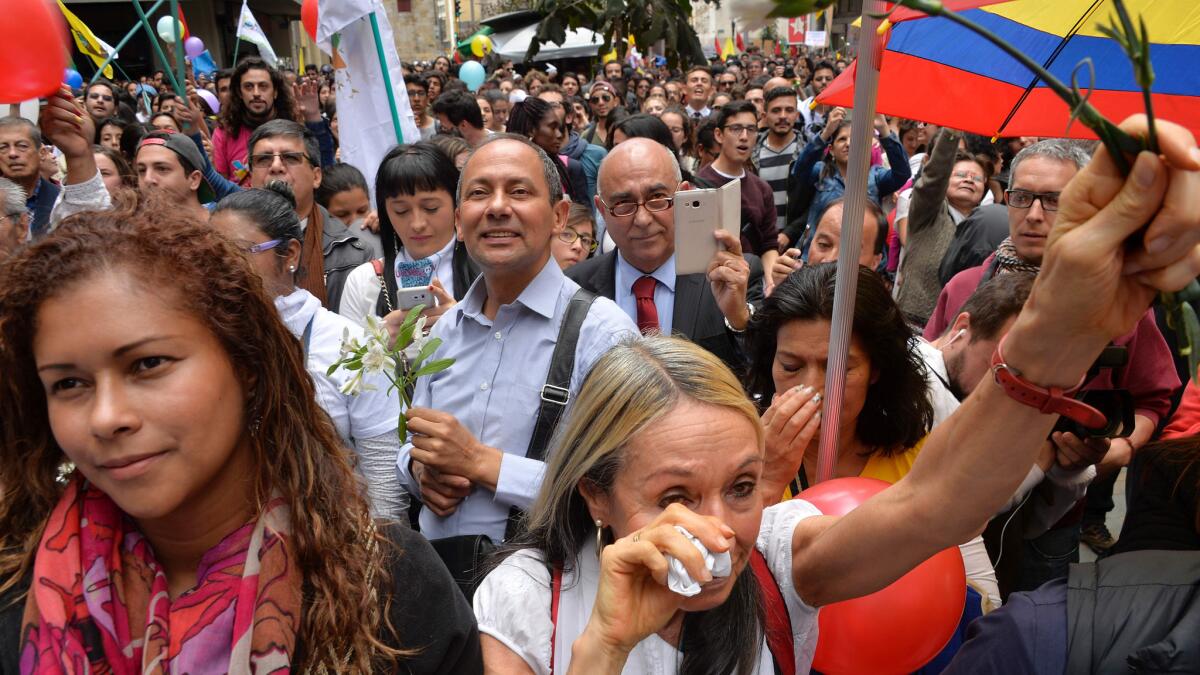Colombia and FARC rebels sign cease-fire deal in a bid to end half a century of war

- Share via
Reporting from Bogota, Colombia — The Colombian government and rebel group Revolutionary Armed Forces of Colombia (FARC) agreed to a definitive cease-fire Thursday, taking an important step in ending half a century of conflict even as daunting implementation issues remain unresolved.
Before several heads of state in Havana, President Juan Manuel Santos and FARC leader Timoleon Jimenez, known as Timochenko, announced an end to 52 years of hostilities that have claimed hundreds of thousands of lives and billions of dollars.
“Today is a historic day for our country after 52 years of death, bombings and pain,” said Colombian president Santos. “The youth of our country have never known a single day without violence. But today we have turned this long and tragic page in our history.”
The cease-fire extends a provisional measure that has been in effect since July 2015. Both sides also agreed that 7,000 rebels will give up their arms within a six-month period and be relocated from the rural and remote areas where they have been operating to 23 government-designated locations.
The youth of our country have never known a single day without violence. But today we have turned this long and tragic page in our history.
— Juan Manuel Santos, Colombia’s president
The United Nations is tasked with collecting weapons from the rebels. A tripartite force including government and FARC representatives as well as U.N. personnel will be put in place to monitor the demobilization. Rebels will be free to come and go unarmed from the concentration zones and camps, which were described as temporary.
Like previously announced partial agreements, the measures will not take effect until and unless a comprehensive deal is signed and Colombian citizens approve it. Government sources say such a vote could be held in September or October.
U.S. Secretary of State John Kerry issued a statement describing the agreement as a milestone. “President Santos deserves credit for his courage, leadership and unwavering commitment to peace,” Kerry said.
But obscured in the celebratory atmosphere of the signing were the hurdles still to be surmounted.
Among deal points still to be fleshed out are specifics of the FARC’s participation in Colombia’s political process. The rebels have been promised a set number of seats in the congress, for example, but it is unclear how many and for how long a term.
See the most-read stories this hour >>
It is also unclear how exactly the final deal will be approved — whether through a referendum, the option the government favors, or through a constitutional assembly, as the rebels have demanded.
Voter approval of a final deal is seen as probable but not certain, as the peace deal has met with significant opposition. Popular former President Alvaro Uribe is one of its biggest detractors.
Recent polls have given Santos less than 25% approval ratings. Earlier this month, he warned that rejecting a peace would lead to “urban warfare” with FARC. Uribe criticized him for using pressure tactics on voters.
“Most Colombians want peace, but they are skeptical and do not trust the FARC to honor its commitments,” said Bruce Bagley, a professor at University of Miami. “In the context of Colombia’s economic downturn, prolonged delays in the peace process and Uribe’s unremitting opposition to the peace accord, Santos could easily lose a referendum.”
Perhaps the most pressing longer-term consideration is the cost of implementing the peace agreement, which estimates say could be as much as $40 billion over the next decade. The figure covers the cost of acquiring land, extending credit to demobilized rebels and displaced peasants, and administering reintegration programs. Santos has appealed to international donors for help.
The government is also contemplating paying rebels a monthly stipend, in part to dissuade them from resorting to lives of crime. In addition to drug trafficking and kidnapping, rebels have been blamed for extorting rural businesses and farmers.
“Where will the needed funds come from?” asked Bagley of University of Miami. “Tax increases in Colombia will be hugely unpopular and possibly even suicidal for Santos politically. Major shortfalls could undermine and ultimately derail the peace agreement.”
The U.S. government is expected to chip in and has made a 2017 budget request of $450 million for Colombian aid, according to U.S. Rep Jim McGovern (D-Mass).
Despite certain reservations, many human rights groups hailed the Thursday agreement as good news for Colombia’s rural poor, who have suffered the brunt of Colombia’s long-running civil conflict.
“We really welcome the advances in the accord, although we’d like to see Afro-Colombian and indigenous communities have more of a voice in at the peace table,” said Lisa Haugaard, director of the Washington-based Latin America Working Group.
“There is no turning back,” Cuban President Raul Castro, whose country has hosted the peace talks, said during the signing. “This provides hope to millions whose main concern has been survival in a world convulsed by war.”
Kraul is a special correspondent.
MORE WORLD NEWS
Chinese state media say dozens killed by powerful tornado
Armed man storms German theater, is shot to death by police
Brazil beefs up security for the Olympics after high-profile attacks
More to Read
Sign up for Essential California
The most important California stories and recommendations in your inbox every morning.
You may occasionally receive promotional content from the Los Angeles Times.











